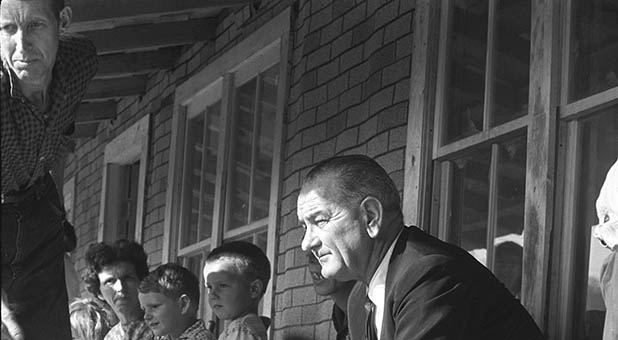To kick off his 1964 “war on poverty” initiative, President Lyndon B. Johnson held a photo op at the home of a man named Tom Fletcher, an unemployed 38-year-old father of eight. While Fletcher benefited from Johnson’s welfare programs, he never managed to climb out of poverty. Fletcher even remarried and had two more children—one of whom his new wife murdered to collect the burial benefits.
As AEI president Arthur Brooks notes, “In 2004, with his wife still in prison, Fletcher died, never having gotten much closer to the American dream than he was when Johnson climbed onto his porch.”
The problem, as Brooks explains, is not merely that men like Fletcher face a material deficit, but that they struggle with a “dignity deficit”:
At its core, to be treated with dignity means being considered worthy of respect. Certain situations bring out a clear, conscious sense of our own dignity: when we receive praise or promotions at work, when we see our children succeed, when we see a volunteer effort pay off and change our neighborhood for the better. We feel a sense of dignity when our own lives produce value for ourselves and others. Put simply, to feel dignified, one must be needed by others.
The War on Poverty did not fail because it did not raise the daily caloric consumption of Tom Fletcher (it did). It failed because it did nothing significant to make him and Americans like him needed and thus help them gain a sense of dignity. It also got the U.S. government into the business of treating people left behind by economic change as liabilities to manage rather than as human assets to develop.
The dignity deficit that has resulted is particularly acute among working-class men, most of whom are white and live in rural and exurban parts of the United States. In his recent book Men Without Work, the political economist (and American Enterprise Institute scholar) Nicholas Eberstadt shows that the percentage of working-age men outside the labor force—that is, neither working nor seeking work—has more than tripled since 1965, rising from 3.3 percent to 11.6 percent. And men without a high school degree are more than twice as likely to be part of this “un-working” class.
Click here to read more. {eoa}
Joe Carter is a Senior Editor at the Acton Institute. He also serves as an editor at The Gospel Coalition, as a communications specialist for the Ethics and Religious Liberty Commission of the Southern Baptist Convention and as an adjunct professor of journalism at Patrick Henry College. He is the editor of the NIV Lifehacks Bible and co-author of How to Argue like Jesus: Learning Persuasion from History’s Greatest Communicator (Crossway).
This article was originally published at Acton.org. Used with permission.
See an error in this article?
To contact us or to submit an article
























